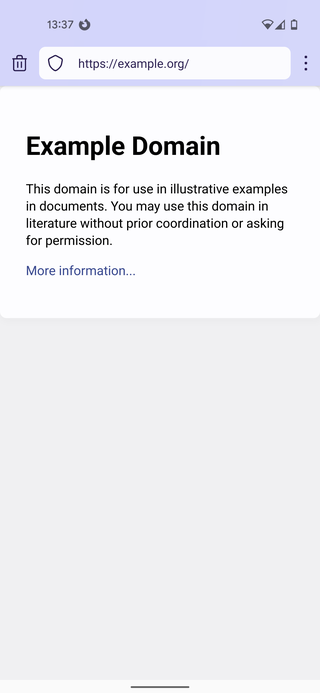Gecko is a browser engine developed by Mozilla. It is used in the Firefox browser, the Thunderbird email client, and many other projects.
seccomp is a computer security facility in the Linux kernel. seccomp allows a process to make a one-way transition into a "secure" state where it cannot make any system calls except exit , sigreturn , read and write to already-open file descriptors. Should it attempt any other system calls, the kernel will either just log the event or terminate the process with SIGKILL or SIGSYS. In this sense, it does not virtualize the system's resources but isolates the process from them entirely.

A virtual keyboard is a software component that allows the input of characters without the need for physical keys. The interaction with the virtual keyboard happens mostly via a touchscreen interface, but can also take place in a different form in virtual or augmented reality.

Zotero is free and open-source reference management software to manage bibliographic data and related research materials, such as PDF and ePUB files. Features include web browser integration, online syncing, generation of in-text citations, footnotes, and bibliographies, integrated PDF, ePUB and HTML readers with annotation capabilities, and a note editor, as well as integration with the word processors Microsoft Word, LibreOffice Writer, and Google Docs. It was originally created at the Center for History and New Media at George Mason University and, as of 2021, is developed by the non-profit Corporation for Digital Scholarship.
InScript is the decreed standard keyboard layout for Indian scripts using a standard 104- or 105-key layout. This keyboard layout was standardised by the Government of India for inputting text in languages of India written in Brahmic scripts, as well as the Santali language, written in the non-Brahmic Ol Chiki script. It was developed by the Indian Government and supported by several public and private organisations. This is the standard keyboard for 12 Indian scripts including Devanagari, Bengali, Gujarati, Gurmukhi, Kannada, Malayalam, Odia, Tamil and Telugu, among others. The InScript layout is built into most of the major operating systems including Windows, and most Linux and Mac OS systems. It is also available in some mobile phones and in Apple's iOS 5 and higher. It is available in Android 4.0 and higher but removed from latest Google Keyboard application (Gboard) and Google Indic Keyboard. It is also available for Windows Mobile 5.x and 6.x from third parties.
Indic Computing means "computing in Indic", i.e., Indian Scripts and Languages. It involves developing software in Indic Scripts/languages, Input methods, Localization of computer applications, web development, Database Management, Spell checkers, Speech to Text and Text to Speech applications and OCR in Indian languages.

Firefox for Android is a web browser developed by Mozilla for Android smartphones and tablet computers. As with its desktop version, it uses the Gecko layout engine, and supports features such as synchronization with Firefox Sync, and add-ons.

WebGL is a JavaScript API for rendering interactive 2D and 3D graphics within any compatible web browser without the use of plug-ins. WebGL is fully integrated with other web standards, allowing GPU-accelerated usage of physics, image processing, and effects in the HTML canvas. WebGL elements can be mixed with other HTML elements and composited with other parts of the page or page background.
Bengali input methods refer to different systems developed to type the characters of the Bengali script for Bengali language and others, using a typewriter or a computer keyboard.

Firefox OS is a discontinued open-source operating system – made for smartphones, tablet computers, smart TVs, and dongles designed by Mozilla and external contributors. It is based on the rendering engine of the Firefox web browser, Gecko, and on the Linux kernel. It was first commercially released in 2014.

Azhagi is a freeware transliteration tool, which enables its users to type in a number of regional Indian languages, including Tamil, Hindi, and others, using an English keyboard. In 2002, The Hindu dubbed Azhagi as a tool that "stand[s] out" among various similar software "emerg[ing] nearly every other day". Since year 2000, Azhagi has provided support for Tamil transliteration; this was later expanded to nearly 13 Indian languages, featuring 16 total built-in languages as of the day of writing.
This is a comparison of mobile operating systems. Only the latest versions are shown in the table below, even though older versions may still be marketed.

Wear OS is a version of Google's Android operating system designed for smartwatches and other wearables. By pairing with mobile phones running Android version 6.0 "Marshmallow" or newer, or iOS version 10.0 or newer with limited support from Google's pairing application, Wear OS integrates Google Assistant technology and mobile notifications into a smartwatch form factor. Wear OS is closed-source, in contrast to the free and open-source Android.
Swatantra 2014 was the fifth international free software conference organized by the International Centre for Free and Open Source Software (ICFOSS), an autonomous organization set up by the Government of Kerala, India for the propagation of FOSS. It was held in Thiruvananthapuram, Kerala, India during 18–20 December 2014. Among supporting organizations of the conference were the Free Software Foundation of India, Centre for Internet and Society (India), Software Freedom Law Center (India) and Swathantra Malayalam Computing.
The state of Kerala, in India has had an active Free software community since early 1980s. The initial users were those who started using TeX in the city of Thiruvananthapuram. Subsequently Free software users groups were formed in some of the different cities like Thiruvananthapuram, Kochi and around engineering colleges in the state. The Free software community in Kerala was instrumental in creating a policy environment at the state government level that was biased towards Free software. The government of Kerala policy on Free software gives first preference to Free and Open Source software for its IT requirements. The state claims to be the only state in the world where IT education is imparted over a Free software operating system.
The origins of the Free software community in Thiruvananthapuram can be traced back to the group of TeX users around the University of Kerala in early 1980s. The community then later named themselves Thiruvananthapuram LUG, GNU/Linux Users Group, Thiruvananthapuram and then ultimately Free Software Users Group, Thiruvananthapuram. The community has worked with the government in helping with key Free software initiatives in the government and also in promoting and supporting Free software among the general public. The community has also been instrumental in creating an IT policy favorable to Free software in the state of Kerala.

Firefox Focus is a free and open-source privacy-focused mobile browser by Mozilla, based on Firefox. It is available for Android and iOS smartphones and tablets. Its predecessor, Focus by Firefox, was released in December 2015 as a tracker-blocking application which worked only in conjunction with the Safari mobile browser on iOS. It was developed into a minimalist web browser in 2016 but retained this background blocking functionality. The Android version of the browser was first released in June 2017 and was downloaded over one million times in the first month. As of January 2017, it was available in 27 languages. The version released for German-speaking countries has telemetry disabled and is named Firefox Klar to avoid ambiguity with the German news magazine FOCUS.
Indic OCR refers to the process of converting text images written in Indic scripts into e-text using Optical character recognition (OCR) techniques. Broadly, it can also refer to the OCR systems of Brahmic scripts for languages of South Asia and Southeast Asia, not just the scripts of the Indian subcontinent, which are all written in an abugida-based writing system.
Mohammed Maqbool Mansoor is an Indian playback singer and lyricist who works in the Malayalam films. He is known for his works in Ennu Ninte Moideen, Charlie and Trance.

The Bharati script is a constructed script created by a research team led by V. Srinivasa Chakravarthy at IIT Madras. It is designed to serve as a common script or link script for Indian languages. It is a left-to-right abugida in which the vowel diacritics maybe placed below, upon, or to the right of the primary character.









